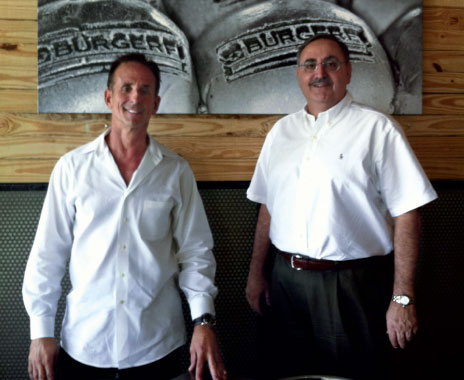Jim Pagano knows what it takes to run a successful business venture, having previously worked in electrical product manufacturing in Asia and in home-furnishing stores.
He and his business partner, Henry Talerico, recently took their expertise into the quick-service space and now own a BurgerFi in Winter Park, Florida. Eighteen months after open, Pagano and his partner are operating one of the top-performing BurgerFi units and have plans for 10–15 additional locations, four of which will open in the next six months.
Pagano says their success stems not just from experience, but also from constant participation with local charities. He discusses how franchisees can invest in charitable giving while ensuring a steady profit.
1. Do good by doing good
This type of business automatically lends itself to giving back to the community, and we knew it was necessary for us to do that. We, along with the franchisor, believe it is simple: We do good by doing good. We strive to become part of the community. Additionally, each community has its different, personal needs. When we started charitable giving, we wanted to not focus on one particular organization, but make ourselves a part of the community and do what is necessary. Helping with a large national organization, such as breast cancer awareness groups, could be the most important way to give back. For others, it might be a more local-centered effort, like providing lunches for library field trips. The most important thing is to make yourself available to where that particular community needs the help.
We are not predisposed to any one particular event or organization. As the needs arise, we review the opportunity and determine if we can make a difference. The deal-breaker for us won’t come down to a money issue, but the time invested to the cause. The attitude, regardless of the project, should remain the same.
2. Don’t force participation
Giving a helpful hand, whether it is physically or monetarily, is a very personal decision for you and your business. There is no wrong way to give. You have to be a believer in the concept that if you take care of the community, the community will take care of you. We help where we can, when we can, and don’t always look for the business reward each and every time. We believe that it has to be a win-win situation for all involved, but should not be the sole reason for helping the community. It’s about being responsible, not quantifiable.
It’s similar to going green: Are you doing it as additional business revenue, or is it just your social responsibility as a business? It has to feel like the right thing to do. A lot of business owners may be looking for a charitable ROI of sorts.
This is one area of business spending from your budget that requires a leap of faith. There may be no measurable return on the dollars or time invested. We as a franchise are involved because it’s what we feel is necessary, and it’s our duty to be a responsible member of the community.
3. Keep your customers in mind
Franchisees need to feel that the particular charity is something where they can make a difference as a business, and that they can embrace it. We like to be involved with a cause that is either on everyone’s mind or that we find necessary. It should not be a chance to take a political or social stand. We’re there to help if we can, and want to keep it as simple as that.
What’s important to remember is that the customer is the community. They’re the most important people in our enterprise. They end up being the resource upon which the success of our business depends. Even with charitable giving, customer satisfaction should be at the heart of the process. When trying to make a decision, rely on your customer base and utilize the resources they give you. Start slow and pick something that you and your staff can relate to and want to be involved with.
What you’ll accomplish here is two fold: You’ll get the brand recognition you’re looking to ascertain and build team spirit by making it a participating decision. Both the community and your employees, or business as a whole, feel good as a result of your giving. That’s the win-win.
4. Don’t plan too much
When it comes to our charitable efforts, we try not to have a plan. We simply try to fill a void or supply a service. Ask yourself if you can make a difference to that particular charity beyond monetary efforts. Sometimes the fit is not there. We are extremely fortunate that we found a company that has core beliefs that fit with ours. We can see that our efforts have helped the community and can see the business doing well as a result. That’s really what matters. The ROI might not be as crisp as you want, but end results are just as well.
Being a contributor never goes unnoticed. Once you’ve established yourself in the community, the customers become friends and rely on you to provide them a service. From your standpoint, these customers drive your business, so rely on them to further associate yourself as a caring brand. If this happens, the business part of whether or not you’re making any money off of your charitable efforts will take care of itself.












